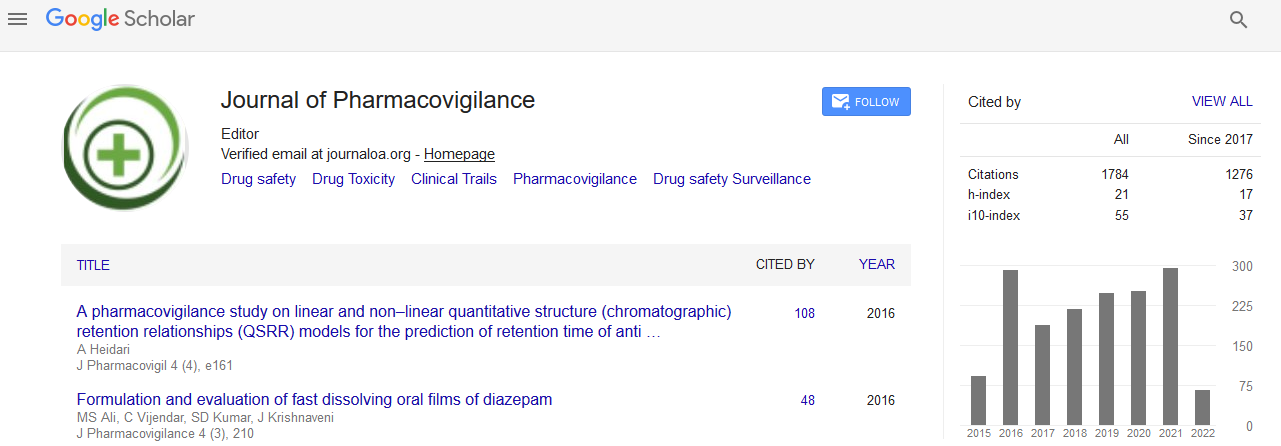Indexed In
- Open J Gate
- JournalTOCs
- The Global Impact Factor (GIF)
- RefSeek
- Hamdard University
- EBSCO A-Z
- OCLC- WorldCat
- Publons
- Euro Pub
- Google Scholar
Useful Links
Share This Page
Journal Flyer

Open Access Journals
- Agri and Aquaculture
- Biochemistry
- Bioinformatics & Systems Biology
- Business & Management
- Chemistry
- Clinical Sciences
- Engineering
- Food & Nutrition
- General Science
- Genetics & Molecular Biology
- Immunology & Microbiology
- Medical Sciences
- Neuroscience & Psychology
- Nursing & Health Care
- Pharmaceutical Sciences
Endothelial function and endothelial progenitor cells in ankylosing spondylitis
3rd International Conference and Exhibition on Pharmacovigilance & Clinical Trials
October 27-29, 2014 Hyderabad International Convention Centre, India
Inderjeet Verma, Ashit Syngle and Pawan Krishan
YRF: J Pharmacovigilance
Abstract:
Background: Endothelial progenitor cells (EPCs) have reparative potential in overcoming the endothelial dysfunction and reducing cardiovascular risk. Objectives: It was tested the potential relationship between endothelial function and EPCs in patients with ankylosing spondylitis (AS). Methods: EPCs (CD34+ CD133+) were quantified by flow cytometry from peripheral blood samples of 23 AS patients (mean age 35.81?8.33; 8 female and 15 male) and 16 healthy volunteers (mean age 32.93?10.16; 7 female and 9 male) matched for age, sex and body mass index. Flow mediated dilation (FMD) was assessed by using AngioDefenderTM (Everist Genomics). Disease severity was evaluated by using Bath Ankylosing Spondylitis Disease Activity Index (BASDAI). Functional ability was monitored by using Bath Ankylosing Spondylitis Functional Index (BASFI). Results: Patients with AS had depleted levels of EPCs (0.028?0.01% versus 0.045?0.01%, P=0.001) and reduced flow mediated dilatation (6.77?2.15% versus 10.06?0.55%; P<0.001) than healthy controls. FMD% significantly correlated with levels of EPCs (P=0.008), Erythrocyte sedimentation rate (P=0.04) and C-reactive protein (P=0.04). Levels of CD34/CD133 positive cells showed a significant correlation between disease duration (P=0.01), BASDAI (P=0.04), ESR (P=0.002) and CRP (P=0.007). Conclusions: Patients with AS free of any other known cardiovascular risk factor demonstrated depleted levels of EPCs and also reduced endothelial function. Endothelial dysfunction significantly associated with reduced levels of EPCs, suggesting that they may contribute to endothelial dysfunction in these patients. EPC would possibly also serve as a novel therapeutic target for preventing cardiovascular risk in AS.
Biography :
Inderjeet Verma after B Pharm had completed M Pharmacy in pharmacy practice in 2008 and currently he is a doctoral research fellow in Department of Pharmaceutical Sciences and Drug Research, Punjabi University, Patiala. He has published more than 9 national and international publications in reputed journals and 18 national (IRACON) and international (EULAR, APLAR and ACR) conference proceedings. Last year he was invited for oral presentation on ?Impact of DMARDs on Autonomic Neuropathy in RA and AS patients? at ACCP 2013, Haiphong, Vietnam. Presently he is working on autonomic neuropathy, stem cells and effective therapy in rheumatic patients.


